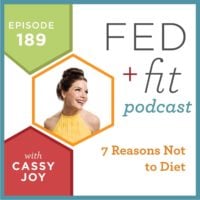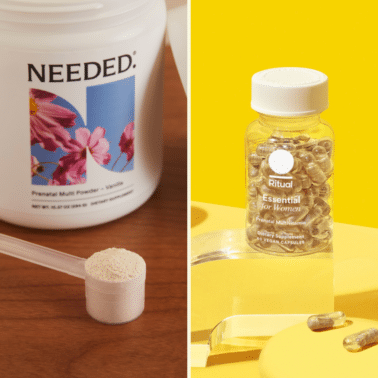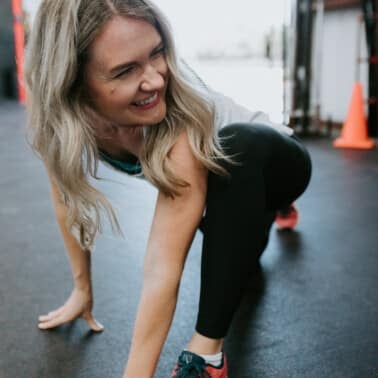On today’s episode I’m going deep and chatting at length about 7 reasons not to diet. This special episode gets down to the REAL reasons why dieting might be hurting you more than it’s helping you!
We’re back with our 189th episode of the Fed+Fit Podcast! Remember to check back every Monday for a new episode and be sure to subscribe on iTunes!
Find us HERE on iTunes and be sure to “subscribe.”
[powerpress]
Episode 189 Sponsors and Featured Partners
- Capilano Beeotic – 100% Australian Honey with natural prebiotics to support gut health, Click HERE to get your own!
- Pride of Bristol Bay – Sustainable, hiqh-quality, nutritious, and wild-caught Alaskan Sockeye Salmon delivered right to your door! Use the code “fedandfit” to get $40 off your first order!
Episode 189 transcription
Cassy Joy: Welcome back to another episode of the Fed and Fit podcast. I am your host, Cassy Joy Garcia. And I am excited to be back today. It has been; man. We’re just two weeks in, and it’s been quite a year already {laughs} hasn’t it? Anybody else? Anyone else feel like it’s been quite a year already?
We are gearing up for probably; not probably. The biggest year of Fed and Fit. And it is very exciting. Lots of moving parts and pieces. Lots of really fabulous contributors on board to help make things bigger and better. And just; it’s shaping up folks, we’re getting there.
Ok, so. I couldn’t help but give y’all that little update. Today we’re going to talk about 7 reasons not to diet. Now let me just throw in a really quick disclaimer. I am not saying that you do not need to diet. If that is something that you’re listening and you’re in the middle of a diet and you feel really good about it and you’re making improvements that you would not have made otherwise, and you believe this is the right choice for you; then by all means, continue. Keep doing that. Tune out. You can come back and listen to this later if you decide that you might need to hear what I’ve got to say today at a different time.
But, if you’re the kind of person that is looking for maybe a different perspective on diets. And maybe you would like to know from a different vantage point. What else should I be considering, or could I be considering when it comes to diets? Aside from the onslaught of commercials, and lose 20 pounds by spring break kind of advertisements that we’re being just peppered with right now. So that’s what we’re going to chat about.
I have come up with seven reasons not to diet. And I have lots of good reasons for these reasons, and we’re going to go through them one by one. I hope that they are helpful. I hope that the help you make a very informed decision on what is the right path forward for you. And again, like I said, at the end of the day; and I say this in a lot of my work. I really don’t care what you choose. I just care that you have all the information so that you can choose powerfully.
Alrighty. So if you’re looking for a reason not to diet, reason number one {laughs}; because I definitely, my take on then, which we’ll obviously expand today. My take on diets are that they aren’t actually as necessary as we might think they are to achieve what we thin we want to achieve. So reason number one not to diet; you are an entirely unique individual. Nobody looks like you. Nobody acts like you. Has your upbringing. Your laugh. Your voice. Your talents. Or your preferences.
Which is why there is no reason at all to think that an out of the box, non-custom diet is going to fit you perfectly. Right? It’s like trying to fit a square peg into a round hole. It’s just, you’re never going to find a diet that feels perfect for you. Because you are entirely unique. Ok? Just let that sink in.
I’m going to roll through these really quickly, actually, because I think they’re better said quickly. Number two reason not to diet. You don’t actually want what a diet will actually deliver. You probably want long-term results, right? You’re probably looking for real-deal lifestyle change. One that actually lasts.
So hear me; a diet. A traditional diet. And I know you know what I’m talking about when I say a traditional diet. Right? You know the ones. They’re 30 days long. They’re 28 days long. They’re 21 days long. Whatever it is. And it’s a rip the Band-Aid off, you follow some kind of a program or a meal plan blindly. You vilify foods. You praise other foods. You vilify certain behaviors. And you just throw yourself blindly into a program with the hopes of weight loss. Or with the hopes of long-term healthy lifestyle changes.
What does a diet actually do? They will likely result in short term weight loss, unless you’re extremely intentional and strategic. Which means you’re going to have to critically think your way through it. You’re going to have to think outside the box. And following the one, two, three steps of a diet are not set up to encourage you to think critically. And there’s a really good chance you’ll be back to where you started one or two weeks after it ends, both in mind and in spirit. It’s a very defeating yoyo, and I have had a seat on that train over and over and over again. This is speaking from a lot of experience.
So, number two reason. You probably don’t actually want what a diet will actually deliver. And where it will deliver you is short-term weight loss results, and then you’ll be right back to where you are right now. Unless you do things differently.
Number three; odds are, it will actually be a detriment to your relationship with food. So if you’ve ever dieted before, you’re probably familiar with the term “cheat day.” It refers to a day that you cheat on your diet. And the big, really big problem here, is that it sets you up to think that there are good foods and bad foods. Each kind of food you eat drops weight onto either the good or the bad part of the scale.
If you had a dry chicken salad for lunch, then you feel like you get to put two little weights on the good end of the scale. And if you had a brownie and a glass of wine after dinner, then you ae mentally adding six weights onto the bad end of the scale. Just to make yourself feel really bad about it. And you go to bed feeling like your bad decisions outweighed your good decisions, which means that you need to “make up for it” tomorrow. By either eating squeaky clean; don’t you love that word. Or an extra 30-minutes on the treadmill. Or maybe you do an extra hour on the treadmill. Or more, if you’ve got the time.
The problem with the “good versus bad” food concept, though, is that it stays with you long after the diet is over. I’m talking years and decades after, you are still feeling guilty after order French fries with your burger. And you still feel like you have cheated yourself with that glass of red wine, and that you are too indulgent by ordering the fatty steak versus the steamed fish at dinner.
Diets give food; individual foods. The brownie, the wine, the fatty steak, the French fries, way too much power. And at the end of the day, food is food. It’s not good, and it’s not bad. It’s just food. And some foods will work for your body, and some won’t. But, the foods that don’t work for you are not evil, and they don’t mean that you are bad or that you’re failing yourself by eating them. So, reason number three; odds are it can actually be a detriment to your relationship with food.
Number four reason not to diet; it will drive you further away from intuitive eating. Intuitive eating really is the holy grail of health. I reference this fictional character a lot, but we all know one in real life, or maybe several. We imagine that; we think of them as this naturally healthy person. They get up. They do their 3-mile run, or they go to their CrossFit or their yoga class. And you just see them; they just seem so effortlessly healthy. They have salad for lunch, and maybe they’ll have a brownie if it looks really good. Or they go out to dinner, and they seem to just navigate a menu without fretting over they should have gotten the potatoes au gratin or a baked potato instead. What was the more indulgent choice? They don’t fret over that stuff. They just live their lives, and they seem to be very fit, and healthy, and happy.
That person probably employs the concept of intuitive eating. So let’s dive into this. How to know if you are close to intuitive eating, and understanding that. Do you actually know when you are hungry? Or how about when you’re actually full. Do you know when you’re full? When you’re sitting there in front of that big plate of delicious yummy food. Do you know when you have gotten enough food in your belly? Do you know when you’re actually thirsty and not hungry? Do you know when you are in need of more salt? Or maybe when you are in need of red meat? Or a salad? Or some antioxidant rich berries. Or even a starchy vegetable?
Or, do you look at your plate as a summary of macronutrients? What I mean by this is; how are you choosing your meals? Are you showing up to lunch and saying; man, I would love some leafy green vegetables. That sounds delightful. And you know what, I’m going to ask for some fresh lemon to squeeze on my salad, because I just feel like I want some lemon. I’m drawn to it because I know I probably need the antioxidants. I know I probably need the vitamin C.
Or, do you show up at lunch and think; ok. I’ve got 9 grams of carbs that I can cash in here. And I need to get 20 grams of protein, and I need to get however many grams of fat. And I’m going to allow myself 4 blueberries. What kind of a lunch orderer are you? How do you size up your plate?
Or, of course, there’s the third option and you don’t think about either one of those things. You don’t listen to your body, and you’re not trying to calculate your plate. You’re just like; I want the nachos because I saw them walk by on someone else’s tray and it looked incredible. And that’s fine. I’m definitely a lot of times in that season.
But, intuitive eating is when you’re listening to what your body is telling you it wants, and you give it that. You don’t come into it calculating, because your body is going to be more perfect and provide more perfect direction than the calculation of what foods to put on your plate.
Number five reason not to diet; you are starting a cycle that many people are desperately trying to break. In our line of work here at Fed and Fit, both at certified nutritionists and wellness program designers, we spend a lot of our time, if not the majority of our time, coaching folks who are trying to stop dieting. It’s a really vicious cycle.
Remember how I said, what was it, reason number two; you don’t actually want what a diet will deliver, because it will probably deliver you in the same exact seat two weeks after it’s over, feeling worse about yourself and having a worse relationship with food. And then you look at your plate, and you’ve ordered the nachos and you’re feeling guilty about it. It’s self-deprecating behavior. And all of a sudden the weight is starting to come back on. So what do you do to fix it? You jump back into another diet. And then the process repeats itself.
I know this process intimately, because as I’ve told y’all many times here, I have been through it a lot. So if you’re thinking about starting a diet for the first time, know that the cycle you’re about to jump into; it’s a good chance that it’s hard to get out of it.
Ok, reason number six. It could have a major negative impact on adrenal and reproductive health. And this is, of course, unless facilitated by a health care professional or a certified nutritionist of some kind. What I want to talk about here are the people who think that they desperately need to lose weight. I’m talking about you. You might have an inkling of awareness. You may have an inkling of awareness, and I hope you hear me if you do.
If you’re the kind of person that does not actually need to lose a whole lot of body fat. Maybe you have a little touch of bod dysmorphia. You look in the mirror and you see somebody who is overweight, when in reality you’re probably not actually what you’re seeing. And I have been through this, a little body dysmorphia. And what I want you to do, especially ladies, I want you to think about your adrenals. Metabolism, energy, and/or your reproductive system. We’re thinking period regularity; your fertility. These things are greatly impacted by how you nourish your bodies. And calorie restricting past a certain threshold can have a major impact on your health outside of body fat percentage.
Yes, you can lose body fat. Yes, you can lose weight which is even more indiscriminate because weight could also mean muscle mass. But an impact of restricting too much, eating too nutrient depleted foods for too long can have an impact on your body that lasts far longer than that momentary weight loss.
This kind of sounds a little alarmist, but I have to tell you. I’ve worked with a lot of folks who have restricted themselves into adrenal fatigue. They have restricted themselves into their period stopping. Or they’re trying to; maybe they’re between babies. Maybe they just had a baby, and they were very hard on themselves. And it’s hard as a mom. I get it. Especially in today’s day and age. You’re scrolling on Instagram, and you see these incredible women who have four-month-olds, and it looks like they never, ever had a baby. We see that.
We judge ourselves as compared to what we are seeing on what they chose to share on social media. And we think; oh my goodness. I’m doing this wrong. I need to lose all this weight. And we restrict ourselves. We get desperate, and we restrict ourselves. And all of a sudden we are compromising our adrenal, reproductive, you name it health. Our endocrine system essentially.
And we just need to ask ourselves; is it worth it? Is it worth jeopardizing a part of that health? Of course our bodies are made to heal, and of course they can come back from that. But is it worth putting those things momentarily on hold for you? Is it worth potential hair loss? This is extreme, but this is the road we could potentially go down. Hair loss, bone density loss, or missed periods. Extreme calorie restriction can add up, and I really want you to take it seriously.
Ok. Number seven. This is also a big one; this is a passion project of ours, of course. But the last reason I want to talk about, reason not to diet, is you are fueling the quick solution obsession of our world. And I know we’re all in the same boat here. We dream of a day in the future when that pendulum swings back in the other direction. Where immediate gratification is no longer in vogue, and slow foods start beating out fast foods mainstream. And when folks actually savored the journey of a long-term goal.
But that being said, and if we’re really honest, supporting the quick fix diet industry. I’m talking about the 21 days, 28 days, 30 days, you name it. Is directly in support of our society’s obsession with quick fixes. If we want to break the diet cycle, slow things down, become more intentional. Which means more lasting. Then we must walk the talk in all areas of our lives. We need to show patience for a longer, more sustainable journey. And we need to have the courage to say no to quick smoke and mirror solutions. We need to stop jumping into cheap, fast burn solutions that leave us feeling defeated, deflated, and devalued.
And you can actually make a difference; a really big difference in my firm belief, by saying no to diets.
Alright, friends. I hope you enjoyed that rant of an episode. {laughs} I just get tired of it. I get tired of seeing all of the ways that you can really quickly fix your life, and really quickly shed those 30 pounds, 20 pounds, 5 pounds. Get back into your prebaby body. Or go ahead and rip yourself into that six pack by spring break. It just makes me crazy.
Because what they’re selling you; it’s smoke and mirrors. It’s not truth. It’s not actually going to work that way. And I just want to empower you to think outside the box. Remember that you are unique, and your unique healthy lifestyle prescription, so we can call it, is going to look nothing like your neighbors. It’s going to look nothing like your partners, or your child’s, or your parents. It’s going to be unique to you.
And I really encourage you; strap on your thinking cap and start building it. You can do this. Make good decisions. Think; is this a good decision for my body. Start doing things that make good practical sense. Go for walks. Drink some water. Eat some vegetables. Maybe don’t punish yourself when you have a brownie, and punish yourself by having to eat the whole tray. You can get there. Slow and steady not only wins the race, but actually completes the race. Or realize that there is no race at all. My whole analogy just fell apart on me. {laughs}
Ok, that’s all I have for you today. As always, you can find a full transcript over at www.FedandFit.com. And we will be back again next week. Y’all have a great week.












